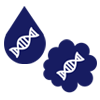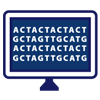
Understanding which gene mutations occur in your patient’s tumor and how they affect cancer-related cell signaling pathways to drive tumor growth provides the key to finding a suitable personalized therapy. More and more studies highlight the strong association between the genetic alterations of a patient’s tumor and the success of using tailored targeted therapies. These targeted therapies are already commonly used for some cancer types, such as for lung cancer, but are effective in a wide variety of cancer types.
ACT Genomics performs comprehensive genetic testing for your patient’s cancer. We analyze samples by next-generation sequencing with subsequent bioinformatics data processing and then utilize clinical databases to identify most promising matching tailored treatment options for your patients!
ACT Genomics provides pan-cancer panels and cancer-specific panels to serve patients with solid tumors. The panels designed for the analysis of important genes associated with targeted therapies are ACTDrug®+ and ACTOnco®+. We offer ACTMonitor™ and ACTBRCA™ to provide further information for treatment and cancer monitoring; the panel ACTRisk™ can identify individuals with an enhanced cancer risk and enable preventive actions.
With years of experience in Next Generation Sequencing (NGS) and clinical settings, we are capable of handling various specimens, including FFPE, frozen tissue, core needle biopsy, pleural effusion and ascites samples. With just a fraction of precious specimens, we can achieve an average sequencing depth of 1,000X to detect genetic alterations with high sensitivity. We are dedicated to deliver highly accurate results that cover all aspects of cancer, from diagnosis and treatment selection to disease monitoring. Our comprehensive report, including genomic alteration status, the biological function of mutated genes, our in-house curated cancer signaling pathways and therapeutic implications, covers the most relevant clinical evidence. It supports physicians to translate genomic information into a tailored treatment and to make the best therapeutic decision for their patients.
We have different genomic profiling services which can satisfy individual patients’ needs. Using genetic testing before cancer treatment can help you to develop a better treatment strategies for your patients. To understand which therapy bests suits your patient, it is important to understand the mechanism driving the growth of your patient’s tumor. Since 300 to 400 genes in different cancer signaling pathways may be involved in this process, comprehensive genomic profiling services are required for thorough analysis. ACTOnco®+ is a comprehensive tumor genomic profiling service that covers more than 400 cancer-related genes to uncover the cancer mechanism of your patient and find the most appropriate matching targeted therapy based on a whole pathway analysis.
ACTDrug®+ is a tumor genetic test that precisely analyses carefully selected cancer-related genes with well-defined therapeutic implications, especially for patients with breast, lung and colorectal cancer.
ACTBRCA ™ detects germline and somatic mutations in the BRCA1/2 genes. The test is therefore capable to identify patients with breast, ovarian, prostate and pancreatic cancer that may benefit from targeted therapy by PARP inhibitors and informs about an inherited risk for developing those specific cancers.
If you would like to have a comprehensive evaluation of chemotherapy and targeted therapy choices for your patient, you may consider using our comprehensive genomic profiling service: ACTOnco®+.
If you would like to have an evaluation of targeted therapy choices for your patient, you may consider using our targeted genomic profiling service: ACTDrug ®+
If you would like to have an evaluation for specific drug choices for your patient, you may consider using our BRCA1/2 analyzing panel, ACTBRCA™



Monitoring tumor relapse and therapy success by imaging methods or traditional cancer biomarkers such as CEA only allow a delayed assessment of tumor development. These tests are less accurate than liquid biopsy tests that detect circulating tumor DNA (ctDNA) in the blood. ACTMonitor™ detects changes in the levels of ctDNA fast and accurately and therefore allows a real-time monitoring of changes in tumor burden. The test informs you about therapy success, resistance and tumor relapse very early and enables you to make faster adaptions of your patient’s treatment. If you would like to monitor treatment more effectively for your patient, you may consider using our ctDNA detection service, ACTMonitor ™

Cancer immunotherapy can have impressive long-lasting effects, but not all patients are likely to benefit from this costly treatment. Patients treated with checkpoint inhibitors respond better to immunotherapy if their tumors harbor high mutation burden.
ACTOnco™ helps you to evaluate the patient- specific tumor mutation burden and to predict if your patient is likely to benefit from using immunotherapy with checkpoint inhibitors.
If you would like to predict if you are suitable for immunotherapy, you may consider using our immunotherapy response prediction service, ACTOnco ™

Approximately 5-10% of cancers are caused by inherited genetic variants (germline mutations). In addition to the well-characterized BRCA1/2, mutations in many other genes also cause a higher lifetime risk of cancer, up to 10-90 times higher than for someone without a mutation. Therefore, understanding the hereditary cancer risk can assist a medical professional to better diagnose and manage the disease.
ACTRisk™ is a fast and accurate genetic test analyzing 32 genes strongly associated with common hereditary cancers. It provides important genetic information that helps physicians and genetic counselors to precisely evaluate cancer risk and discuss risk management options with clients.


2018-08-01
Cancer immunotherapy has been hailed as the most promising treatment against cancer in recent decades, but what exactly is immunotherapy? Is Immunotherapy right for me?

2018-07-25
According to an ongoing phase I trial presented at the ASCO 2018 Annual Meeting, Trastuzumab deruxtecan (DS-8201a) demonstrated promising efficacy in heavily pretreated subjects with HER2-expressing gastric cancer.

2018-07-25
According to findings from the phase I LIBRETTO-001 study presented at the 2018 ASCO Annual Meeting, LOXO-292 demonstrated impressive clinical efficacy across RET-altered solid tumors.

2018-08-01
The U.S. FDA approves Encorafenib plus Binimetinib in combination for patients with BRAFV600-mutant melanoma based on the phase III COLUMBUS trial.

2018-07-25
A pan-FGFR tyrosine kinase inhibitor, TAS-120, shows significant effect in cholangiocarcinoma patients with FGFR2 gene fusion.

2018-07-25
Mayo clinic enrolled 3030 cases with pancreatic cancer from 2000 to 2016, and identified 21 cancer predisposition genes. The test results were then compared with controls from gnomAD and ExAC database. From this case-control study, mutations in those 6 ge

We are highly experienced and possess professional high standard procedures in the challenging process of retrieving DNA from FFPE samples for sequencing. Our scientists have optimized the methodology to consistently achieve successful sequencing with highly accurate results. In addition to FFPE samples, our platform also works with core needle biopsies, pleural effusion, ascites, blood samples, and buccal swaps.

ACT Genomics has established a state-of-the-art next generation sequencing (NGS) platform. Sequencing is performed on Ion Personal Genome Machines, Ion Proton sequencers and Illumina MiSeq; ACT Genomics is an Ion Torrent™ Certified Service Provider.

ACT Genomics integrates advanced annotation and visualization tools, coupled with public and proprietary databases to deliver comprehensive and comprehensible reports.

With accurate genomic profiling, visualizing genes with alterations in known cancer pathways and providing potential matching cancer targeted treatments from FDA and National Comprehensive Cancer Network (NCCN) guidelines, mutated sub-network in known pathways, as well as references, ACT Genomics aims to deliver a concise, reliable and actionable meaningful clinical report.
| Service | Why? (Purpose) | Who? (Design for) | What? (Tested Gene) | When? (Turnaround Time) | How?(Sample Requirement) |
|---|---|---|---|---|---|
ACTOnco®+ |
Comprehensive genomic profile and recommendations of targeted drugs |
|
Comprehensive profiling genomic profiling for 440 cancer-related genes | 14 Calendar days |
|
ACTDrug®+ |
Providing tailored drug options |
|
Genomic profiling for 35 druggable genes | 14 Calendar days |
|
ACTBRCA™ |
Analyzing BRCA1/2 exons and detects somatic and germline mutations |
|
Sequencing of all BRCA1/2 exons | 14 Calendar days |
|
ACTMonitor™ |
Monitoring of cancer recurrence and drug resistance |
|
Sequencing from 8-50 genes (optionable panels for specific cancer types) | 14 Calendar days | Whole blood (Plasma) |
ACTRisk™ |
Identify genetic alterations related to hereditary cancer |
|
Sequencing 32 hereditary cancer related genes | 30 Calendar days |
|